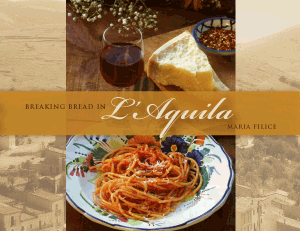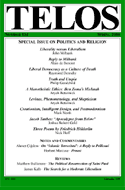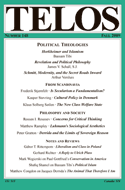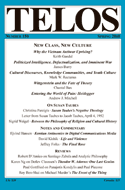 The founder and long-time editor of Telos, Paul Piccone, was born in Italy on January 17, 1940, in the city of L’Aquila, the capital of the Abruzzo. He combined philosophical passion with an irrepressible instinct for hospitality, and this was nowhere clearer than in the way he would generously gather friends and strangers together for meals that celebrated both food and thought. His culinary skills, of which he was legitimately proud, were only enhanced when he married Marie Filice, an accomplished chef in her own right. Since Paul—ever the traditionalist—and Marie made many trips to L’Aquila, the menu in their New York home was constantly renewed through those returns to the ancestral source. That profound connection to the past provided the foundation for the welcoming hospitality, where a set table was always a celebration.
The founder and long-time editor of Telos, Paul Piccone, was born in Italy on January 17, 1940, in the city of L’Aquila, the capital of the Abruzzo. He combined philosophical passion with an irrepressible instinct for hospitality, and this was nowhere clearer than in the way he would generously gather friends and strangers together for meals that celebrated both food and thought. His culinary skills, of which he was legitimately proud, were only enhanced when he married Marie Filice, an accomplished chef in her own right. Since Paul—ever the traditionalist—and Marie made many trips to L’Aquila, the menu in their New York home was constantly renewed through those returns to the ancestral source. That profound connection to the past provided the foundation for the welcoming hospitality, where a set table was always a celebration.
|
It is widely accepted today that the modern concept of citizenship has become defined as biological or biomedical citizenship. Current perspectives on the practices of health and illness underestimate the effects of two increasing trends, hyperspecialization and universalization, which combine into a process of virtualizing biomedical practice and research toward the production of practitioners, patients, and medical concepts of normalcy and pathology that fit in with the demands of an information- and knowledge-based economic regime. The process has led to the emergence of the ideal type of the virtual patient. As a virtual patient, a suffering individual is reduced to a bureaucratically manageable case file. I suggest that we need to provide a conceptual framework that can account for the developments in biomedical and mental health research and enable patients, doctors, and caregivers to cooperate in favor of the individual patient’s health, autonomy in his/her decision, and his/her positive development of life-course—understood to be the modern meanings of life, liberty, and the pursuit of happiness in matters of health care. On Tuesdays at the TELOSscope blog, we reach back into the archives and highlight an article whose critical insights continue to illuminate our thinking and challenge our assumptions. Today, Francisco Unger looks at John Milbank’s “Liberality versus Liberalism,” from Telos 134 (Spring 2006). The following post is a reply to Rolf Hugoson’s post “Debating the Nordic Consensus Culture.” Rolf Hugoson has, for some reason, felt challenged by the way three Danish papers appeared in Telos under the headline “From Scandinavia.” Apparently, he missed the token Swede in the lineup of contributors.
This text was presented in January at the 2010 Telos Conference, “From Lifeworld to Biopolitics: Empire in the Age of Obama.” President Obama was awarded the Nobel Peace Prize. Messianic peace was signified by the person conservatives and liberals labeled “messiah” or “the One.”[1] The Nobel committee symbolically demonstrated deliverance by promises of “change” and “hope.”[2] One week before the award another part of a media eschaton materialized: publicly contemplating a military coup to thwart the “Obama problem.” Appealing to U.S. military leaders in eight, compact bullet points, a well-credentialed journalist wrote: “Military intervention is what Obama’s exponentially accelerating agenda for ‘fundamental change’ toward a Marxist state is inviting upon America. A coup is not an ideal option, but Obama’s radical ideal is not acceptable or reversible.”[3] If right-wing American media, through its core of movement conservatism, announced Obama martyrdom, the Nobel Committee announced resurrection. |
||||
|
Privacy Policy · Data Protection Copyright © 2025 Telos Press Publishing · All Rights Reserved |
||||
 John Milbank’s article “Liberality and Liberalism,” as evidenced by its suggestive title, pulls some of the conventional punches. There is a dichotomy between the values of the Enlightenment-affected liberal mindset and the real turnout of liberal institutions. Crass egotism in the market, chilled international relations, and a profaned life for the individual are the fruits of a social model that bases itself on supposedly “natural” conditions of humanity and utility. The unconventional part of Milbank’s critique rests precisely in his religious foundations. He wants a revival, or perhaps the birth, of radical social criticism based on Catholic theology. There is probably some ire to Milbank’s voice, because he is challenging a liberalism that thought it had put such religious dissidence to rest—therein the “liberality” of the marketplace, in which all are accommodated and all space is taken over. But Milbank believes post-Enlightenment efforts for reform based on secular grounds have mostly come to naught. Looking around in the present day, the reader is likely sympathetic. The entrance of divine grace into human life, the Christian guiding light of charity, and the notion of an exchange of gifts as the only fair exchange (non-exploitative), are all solutions to our unhappy liberal aporia. At least that is Milbank’s story.
John Milbank’s article “Liberality and Liberalism,” as evidenced by its suggestive title, pulls some of the conventional punches. There is a dichotomy between the values of the Enlightenment-affected liberal mindset and the real turnout of liberal institutions. Crass egotism in the market, chilled international relations, and a profaned life for the individual are the fruits of a social model that bases itself on supposedly “natural” conditions of humanity and utility. The unconventional part of Milbank’s critique rests precisely in his religious foundations. He wants a revival, or perhaps the birth, of radical social criticism based on Catholic theology. There is probably some ire to Milbank’s voice, because he is challenging a liberalism that thought it had put such religious dissidence to rest—therein the “liberality” of the marketplace, in which all are accommodated and all space is taken over. But Milbank believes post-Enlightenment efforts for reform based on secular grounds have mostly come to naught. Looking around in the present day, the reader is likely sympathetic. The entrance of divine grace into human life, the Christian guiding light of charity, and the notion of an exchange of gifts as the only fair exchange (non-exploitative), are all solutions to our unhappy liberal aporia. At least that is Milbank’s story.  But as for myself, I do not at all address Scandinavia specifically in my paper—I was even unaware the paper was to end up under the headline of Scandinavia. So: sorry for not addressing Sweden in a paper that is not about Sweden, nor indeed about Scandinavia. My paper is about an international issue occurring in many countries: the tension between secularism and defenders of radical religion. For the same reason, I shall not go into Hugoson’s different musings about Scandinavia and the possible causes of minor cultural differences between Scandinavian countries.
But as for myself, I do not at all address Scandinavia specifically in my paper—I was even unaware the paper was to end up under the headline of Scandinavia. So: sorry for not addressing Sweden in a paper that is not about Sweden, nor indeed about Scandinavia. My paper is about an international issue occurring in many countries: the tension between secularism and defenders of radical religion. For the same reason, I shall not go into Hugoson’s different musings about Scandinavia and the possible causes of minor cultural differences between Scandinavian countries.  The paradigm of a “new class” originated in socialist Eastern Europe among dissidents and other regime critics as a way to describe the ensconced stratum of managers, technocrats, and ideologues who controlled the levers of power. The rhetorical irony of the phrase depended on the implied contrast with an “old class” as well as the good old class theory of the orthodox Marxism that once served as the established dogma of half the world. The history of class struggle, which had been history altogether, had culminated in the victory of a proletarian class that in turn had ushered in—or was well on its way to ushering in—a classless society. Or so the grand narrative went. To talk of a “new class,” then, conjured up the unquestionable epistemology of class analysis, while simultaneously challenging the notional outcome: instead of the end of the state and classlessness, one was stuck with police states and a new class that, while eminently cooler than the Bolsheviks of yore, still exercised a dictatorship (of the not-proletariat) while skimming off the benefits of unequal power. The phrase turned Marxism against Marxism during those decades when the fall of the Berlin Wall was not even imaginable.
The paradigm of a “new class” originated in socialist Eastern Europe among dissidents and other regime critics as a way to describe the ensconced stratum of managers, technocrats, and ideologues who controlled the levers of power. The rhetorical irony of the phrase depended on the implied contrast with an “old class” as well as the good old class theory of the orthodox Marxism that once served as the established dogma of half the world. The history of class struggle, which had been history altogether, had culminated in the victory of a proletarian class that in turn had ushered in—or was well on its way to ushering in—a classless society. Or so the grand narrative went. To talk of a “new class,” then, conjured up the unquestionable epistemology of class analysis, while simultaneously challenging the notional outcome: instead of the end of the state and classlessness, one was stuck with police states and a new class that, while eminently cooler than the Bolsheviks of yore, still exercised a dictatorship (of the not-proletariat) while skimming off the benefits of unequal power. The phrase turned Marxism against Marxism during those decades when the fall of the Berlin Wall was not even imaginable. 

